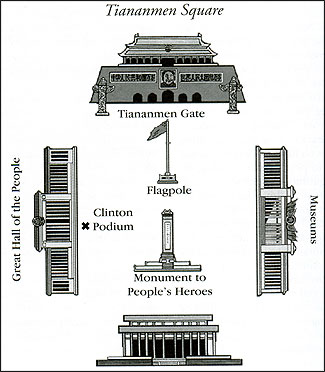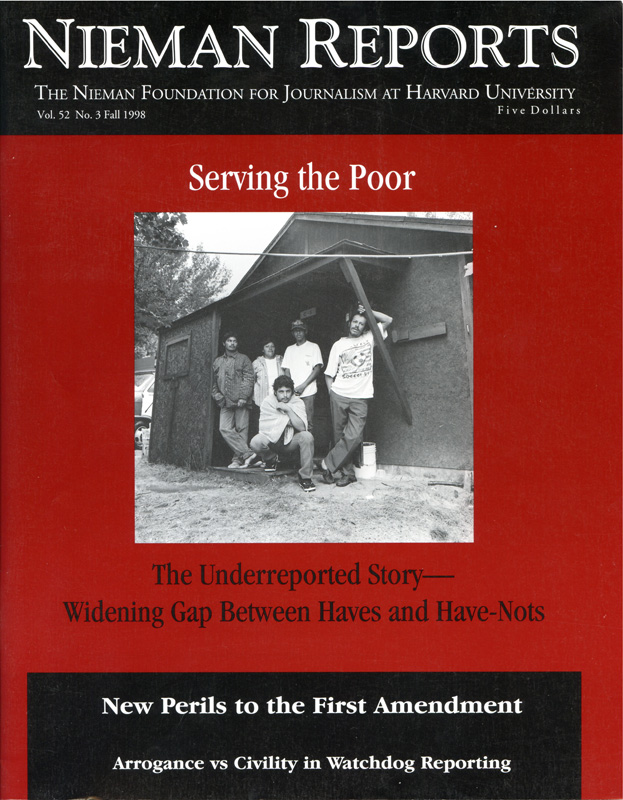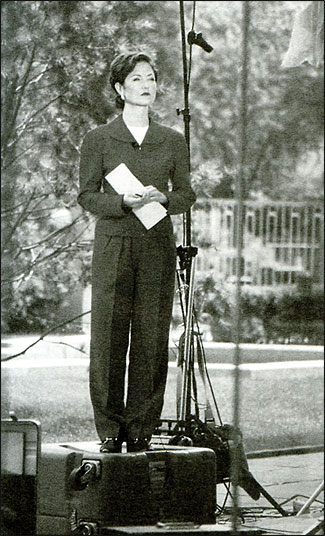I stood under Mao’s portrait as Clinton’s limousine pulled onto Tiananmen. I saw the 21-gun salute fired from the heart of Tiananmen. A brisk arrival ceremony was held directly to the west of the cannons on the sea of paving stones that constitute Beijing’s famous central square.
President Clinton, known for fine semantic distinctions such as smoking marijuana but not inhaling, adopted a Tiananmen-but-not-Tiananmen spin to play down the controversy of the arrival ceremony at the scene of the crackdown on democracy. The President and his aides used words such as “across from Tiananmen Square,” or “in front of the Great Hall of the People adjacent to Tiananmen Square.”
CNN Anchor Joie Chen adopted the White House’s linguistic terms of engagement in an on-air chat with Andrea Koppel, former CNN Beijing Bureau Chief, who knows the geography of Tiananmen as well as anyone. “Clinton will not actually arrive in Tiananmen Square,” Joie Chen said, introducing the segment, “…but right across from the square. It is right across a very small street from the square itself.”
Koppel, speaking from Beijing, responded by talking about the President’s “visit to Tiananmen Square,” and then “corrected” herself by saying “to the edge of Tiananmen Square.”
When Wolf Blitzer spoke from Tiananmen to talk show host Larry King on the day of the official arrival ceremony, he shifted uncomfortably between White House-designated language and what his own eyes told him. “Here, adjacent to, really right next to Tiananmen Square, only 50 yards away or so, this huge square. It was nine years ago at this very spot…”
At a press conference, I pressed White House Press Secretary Mike McCurry for clarification. Why all the hair-splitting about it being “across from” or “adjacent to” the square?
“You were there,” he said, “you tell me.”
“I’m asking you.”
“You could see the geography,” he answered, “you can decide for yourself.”

Adapted from PBS Frontline Web graphic.
President Clinton, known for fine semantic distinctions such as smoking marijuana but not inhaling, adopted a Tiananmen-but-not-Tiananmen spin to play down the controversy of the arrival ceremony at the scene of the crackdown on democracy. The President and his aides used words such as “across from Tiananmen Square,” or “in front of the Great Hall of the People adjacent to Tiananmen Square.”
CNN Anchor Joie Chen adopted the White House’s linguistic terms of engagement in an on-air chat with Andrea Koppel, former CNN Beijing Bureau Chief, who knows the geography of Tiananmen as well as anyone. “Clinton will not actually arrive in Tiananmen Square,” Joie Chen said, introducing the segment, “…but right across from the square. It is right across a very small street from the square itself.”
Koppel, speaking from Beijing, responded by talking about the President’s “visit to Tiananmen Square,” and then “corrected” herself by saying “to the edge of Tiananmen Square.”
When Wolf Blitzer spoke from Tiananmen to talk show host Larry King on the day of the official arrival ceremony, he shifted uncomfortably between White House-designated language and what his own eyes told him. “Here, adjacent to, really right next to Tiananmen Square, only 50 yards away or so, this huge square. It was nine years ago at this very spot…”
At a press conference, I pressed White House Press Secretary Mike McCurry for clarification. Why all the hair-splitting about it being “across from” or “adjacent to” the square?
“You were there,” he said, “you tell me.”
“I’m asking you.”
“You could see the geography,” he answered, “you can decide for yourself.”

Adapted from PBS Frontline Web graphic.




